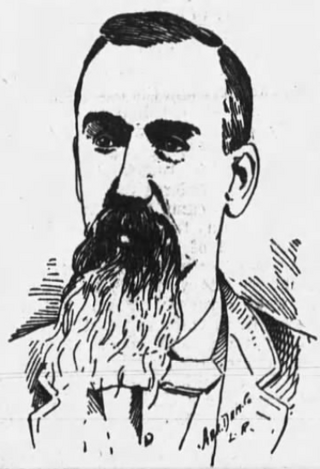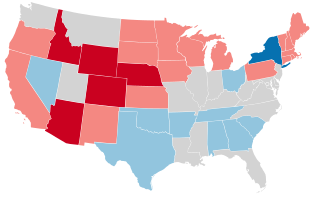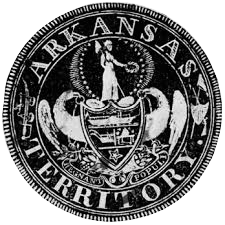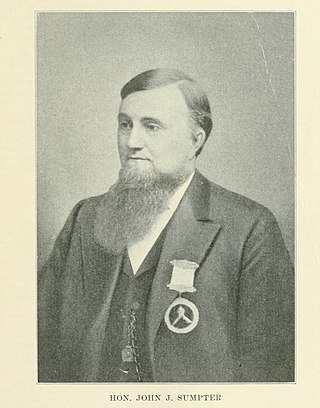Related Research Articles

The Brooks–Baxter War, also known as the Brooks–Baxter Affair, was an attempt made by failed gubernatorial candidate Joseph Brooks of the “Brindle-tail” faction of Arkansas' Republican Party to take control of the state from Elisha Baxter, who was the Republican governor. The victor in the end was the Baxter administration, also known as the "Minstrels", supported by "carpetbaggers" over the Brindle-tails supported by "scalawags" and "freedmen".

James Henderson Berry was a United States Senator and served as the 14th governor of Arkansas. He also served as Speaker of the Arkansas House of Representatives.

James Philip Eagle was an American politician who served as speaker of the Arkansas House and as the 16th governor of Arkansas, a Baptist minister, and president of the Southern Baptist Convention.

Joseph Maull Carey was an American lawyer, rancher, judge, and politician, who was active in Wyoming local, state, and federal politics.
Benjamin Desha was an American soldier and politician. He was a veteran of the War of 1812, and was wounded in the Battle of Mackinac Island. In 1822, Desha was appointed a receiver of public moneys by President James Monroe for the Arkansas Territory and moved there from Kentucky. He died on November 21, 1835.

The Yancopin Bridge is an abandoned railroad moveable bridge spanning the Arkansas River, and the last bridge across the Arkansas River before it flows into the Mississippi River 15 miles to the southeast. It is distinctive not only for its size and remoteness, but also for having not one but two movable spans, one having replaced the other due to river avulsion.

John Chesley Colquitt was an American politician. He was a member of the Arkansas House of Representatives, serving from 1885 to 1888 and from 1893 to 1897. He was a member of the Democratic party.
Dawson Lea Kilgore was an American politician. He was a Democratic member of the Arkansas House of Representatives.

The Forty-Eighth Arkansas General Assembly was the legislative body of the state of Arkansas in 1931 and 1932. In this General Assembly, the Arkansas Senate and Arkansas House of Representatives were both controlled by the Democrats. In the Senate, all 35 senators were Democrats, and in the House, 99 representatives were Democrats, with one Republican. It was the first General Assembly to use redistricted legislative districts from the 1930 United States Census.

United States gubernatorial elections were held in 1918, in 32 states, concurrent with the House and Senate elections, on November 5, 1918.

The General Assembly of the Territory of Arkansas, commonly known as the General Assembly, was the legislature of the U.S. territory of Arkansas, from 1819 to 1835. The General Assembly was directly elected, albeit on a restricted franchise. Its legislative power was subject to veto by the appointed Governor.
Daniel G. McLean was an American lawyer and politician in Florida. He signed the first Florida Constitution in 1838 at St. Joseph, served in the Florida Senate including as President of the Florida Senate, served as Speaker of the Florida Territory's legislature, and was Grandmaster of the Masons. He was a Whig. He lived in Euchee Anna.
George W. Prigmore was a state legislator and government official in Arkansas. He served in the Eighteenth Arkansas Legislature in 1871. He married Anna Elliott.

John J. Sumpter was a lawyer and state legislator in Arkansas, military colonel, hotel proprietor, and lived in Hot Springs, Arkansas, for nearly all of his life. He served in the Arkansas House of Representatives and the Arkansas Senate.
James Henri Burch, often written as J. Henri Burch, was an African American state legislator in Louisiana during Reconstruction, the years after the Civil War. He represented East Baton Rouge Parish in both the state's House of Representatives and Senate and was an important Black political leader in the period.
Robert W. Glover was a teacher, postmaster, tax assessor, judge, state legislator, and Missionary Baptist pastor in Arkansas. He served in both houses of the Arkansas General Assembly.
Joseph F. Wallworth was an American businessman, realtor, and politician from New Jersey.

Arkansas held a general election on November 6, 1934. Held during a midterm year, the state did not vote for President or Senate in 1934. For the United States House of Representatives, each of Arkansas's seven Representatives sought re-election. Only David Delano Glover in the Arkansas 6th was challenged in the Democratic primary, he was defeated by John McClellan. Claude A. Fuller and Tilman B. Parks handily defeated Republican and Independent challengers for the Arkansas 3rd and Arkansas 7th, respectively.
Horace Bull Allis (1813-1868) served as Speaker of the Arkansas House of Representatives and represented Jefferson County, Arkansas. He was a Unionist Republican.
References
- ↑ "Speaker Archive - Arkansas House of Representatives". www.arkansashouse.org.
- ↑ Herndon, Dallas Tabor (December 8, 1922). "Centennial History of Arkansas". S. J. Clarke publishing Company – via Google Books.
- ↑ Daniels, Charlie (July 1, 2009). "The Historical Report of the Arkansas Secretary of State 2008". University of Arkansas Press – via Google Books.
- ↑ Mancini, Matthew J. (October 19, 2022). "One Dies, Get Another: Convict Leasing in the American South, 1866-1928". Univ of South Carolina Press – via Google Books.
- ↑ Harrison, Victoria L. (October 22, 2018). "Fight Like a Tiger: Conway Barbour and the Challenges of the Black Middle Class in Nineteenth-Century America". SIU Press – via Google Books.
- ↑ "Tankersley, Charles W." Arkansas State Land records S-T. September 9, 1872.
- ↑ Herndon, Dallas Tabor (December 8, 1922). "Centennial History of Arkansas". S. J. Clarke publishing Company – via Google Books.